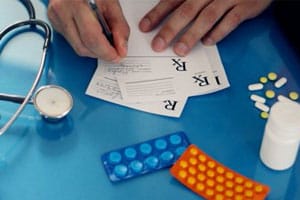
In what consumer advocates are calling a setback in maintaining patient safety, the Supreme Court just ruled that generic drug makers may not be sued under state law for their products’ adverse reactions. In the 5-to-4 vote, the court ruled in favor of Mutual Pharmaceutical Co. (owned by Sun Pharmaceutical Industries Ltd.) in a case […]
 In what consumer advocates are calling a setback in maintaining patient safety, the Supreme Court just ruled that generic drug makers may not be sued under state law for their products’ adverse reactions.
In what consumer advocates are calling a setback in maintaining patient safety, the Supreme Court just ruled that generic drug makers may not be sued under state law for their products’ adverse reactions.
In the 5-to-4 vote, the court ruled in favor of Mutual Pharmaceutical Co. (owned by Sun Pharmaceutical Industries Ltd.) in a case which, according to Reuters, overturned a multimillion-dollar jury award in favor of a significantly injured New Hampshire patient. The patient claimed a generic drug she had taken was not safe based on the drug’s chemical design.
The majority opinion was written by Justice Samuel Alito and stated that the state’s law could not go against federal laws on prescription medicines when the design has been approved by the U.S. Food and Drug Administration (FDA), according to Reuters. Meanwhile, noted Reuters, a 2011 Supreme Court ruling found that drug companies that manufacturer branded drugs are liable for inadequacies in medication label safety warnings, but not the makers of cheaper copies of those medicines, known as generic drug makers.
Public Citizen, a consumer watchdog group, said that the Supreme Court’s decision minimizes patient safety, a significant issue given that the majority—80 percent—of all United States prescriptions are filled with generic drugs, according to Reuters. “Today’s court decision provides a disincentive for generic makers of drugs to monitor safety of their products and to make sure that they have a surveillance system in place to detect adverse events that pose a threat to patients,” Michael Carome, director of Public Citizen’s Health Research Group, said in an interview with Reuters.
Carome also noted that, in many cases, potentially dangerous side effects are not known, seen, or understood until many years—decades—after approval, often after the branded versions are no longer available, wrote Reuters.
With no concern over litigation, “groups that think this undermines patient safety could be onto something,” said David Maris, an industry analyst with BMO Capital Markets. “The blanket protection that they are under now is that if the FDA says you are approved, as long as they (generic company) don’t introduce new problems into the drug then they’re fine,” he added, according to Reuters.
Meanwhile, the Supreme Court recently ruled, in a 5-to-3 vote, that the Federal Trade Commission (FTC) can sue pharmaceutical firms for possible anti-trust violations associated with generic drug deals.
The companies will no longer be able to pay competitors to ensure that cheaper generic versions of popular drugs are kept off the market—so-called “pay-for-delay” or “reverse payments,” according to The New York Times. For consumers, this means that the number of available generic medications will likely increase.
At the time of this ruling, the boom in available generics was considered a win for consumers, but in the face of this week’s ruling, that might be changing.


